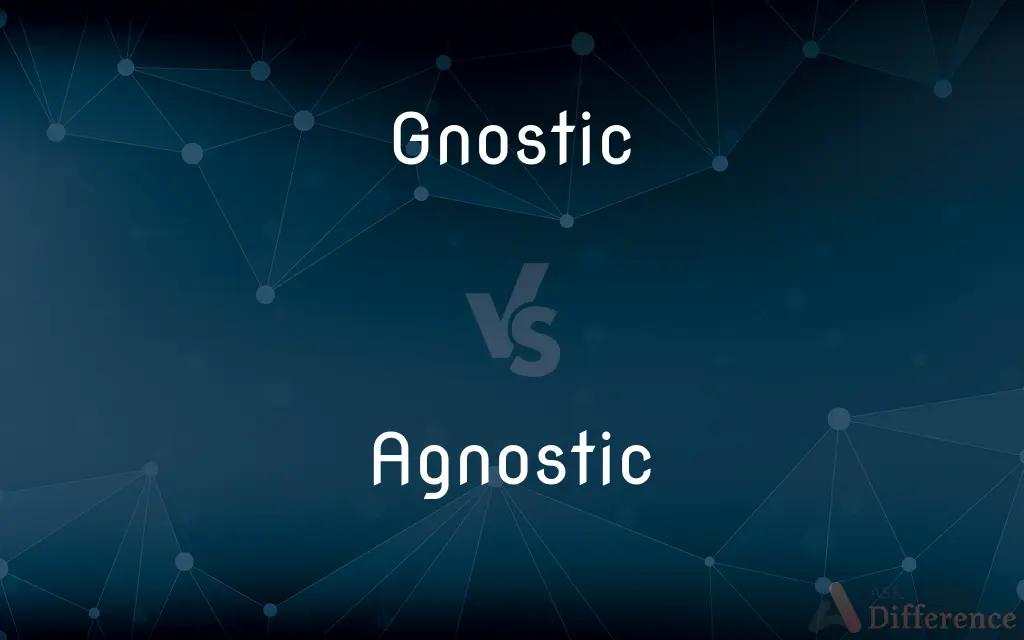Gnostic vs. Agnostic — What's the Difference?
Edited by Tayyaba Rehman — By Fiza Rafique — Updated on October 10, 2023
A Gnostic claims knowledge, especially of spiritual matters. An Agnostic claims neither belief nor disbelief, expressing uncertainty about divine existence or truth.

Difference Between Gnostic and Agnostic
Table of Contents
ADVERTISEMENT
Key Differences
The terms Gnostic and Agnostic originate from different philosophical and religious contexts but have found common use in modern vernacular to denote certainty and uncertainty, respectively.
Gnostic, derived from the Greek word 'gnōsis,' signifies knowledge. Historically, Gnosticism was a collection of ancient religious ideas and systems which believed in obtaining special, hidden knowledge, primarily about the divine or spiritual realm. In broader terms today, to be Gnostic means to claim knowledge or certainty about a subject.
In contrast, Agnostic comes from the Greek word 'agnostos' meaning 'unknown' or 'unknowable.' It was popularized in the late 19th century by biologist Thomas Huxley to describe his approach to religious and metaphysical matters. Agnosticism asserts that certain things, especially the existence of God or the divine, are unknown or unknowable. An Agnostic neither believes nor disbelieves; they simply claim no knowledge of it.
While both terms can be applied to various fields of knowledge, they are most commonly associated with religious and spiritual beliefs. A Gnostic person claims certainty in their beliefs, while an Agnostic person remains neutral, not committing to belief or disbelief.
Comparison Chart
Meaning
Knowledge
Unknown/Unknowable
ADVERTISEMENT
Origin
From Greek 'gnōsis'
From Greek 'agnostos'
Belief System
Claims certainty or knowledge
Claims neither belief nor disbelief
Application
Often in religious/spiritual context
Broadly applied, especially in religious matters
Position
Affirmative stance
Neutral stance
Compare with Definitions
Gnostic
Claiming to have specific knowledge or insight.
She had a Gnostic understanding of the subject after years of study.
Agnostic
Neither believing nor disbelieving in God or religious doctrine.
As an Agnostic, he never participated in religious debates.
Gnostic
Knowing; wise; shrewd.
I said you were a gnostic fellow.
Agnostic
Uncertain or non-committal about a particular thing.
He's Agnostic about the new policy's effects.
Gnostic
Pertaining to knowledge, especially esoteric knowledge of spiritual matters.
The Gnostic teachings were kept secret from the masses.
Agnostic
Indicative of a doubt or lack of commitment.
He had an Agnostic stance on the new proposal.
Gnostic
Related to ancient religious movements emphasizing direct personal experience of the Divine.
Gnostic texts provide insights into early Christian thought.
Agnostic
A person who believes that nothing is known or can be known of the existence or nature of God.
Gnostic
Gnostic Of, relating to, or possessing intellectual or spiritual knowledge.
Agnostic
Relating to agnostics or agnosticism.
Gnostic
Of or relating to Gnosticism.
Agnostic
One who believes that it is impossible to know whether there is a God.
Gnostic
A believer in Gnosticism.
Agnostic
One who is skeptical about the existence of God but does not profess true atheism.
Gnostic
Alternative case form of Gnostic
Agnostic
One who is doubtful or noncommittal about something.
Gnostic
Knowing; wise; shrewd
Agnostic
Relating to or being an agnostic.
Gnostic
Alternative case form of Gnostic
Agnostic
Doubtful or noncommittal
"Though I am agnostic on what terms to use, I have no doubt that human infants come with an enormous 'acquisitiveness' for discovering patterns" (William H. Calvin).
Gnostic
Of or pertaining to Gnosticism or its adherents; as, the Gnostic heresy.
Agnostic
(Computers) Operable or functioning using any operating system or other digital technology. Often used in combination
Software that is platform agnostic.
Gnostic
One of the so-called philosophers in the first ages of Christianity, who claimed a true philosophical interpretation of the Christian religion. Their system combined Oriental theology and Greek philosophy with the doctrines of Christianity. They held that all natures, intelligible, intellectual, and material, are derived from the Deity by successive emanations, which they called Eons.
Agnostic
Of or relating to agnosticism or its adherents.
His agnostic viewpoint is summarized in his book.
Gnostic
An advocate of gnosticism
Agnostic
Doubtful or uncertain about the existence or demonstrability of God or other deity.
She left the church when she had become agnostic.
Gnostic
Of or relating to Gnosticism;
Gnostic writings
Agnostic
Having no firmly held opinions on something.
I'm agnostic on whether ethanol is a green fuel.
He says he's agnostic concerning the Secretary's claims.
Gnostic
Possessing intellectual or esoteric knowledge of spiritual things
Agnostic
Unaware or noncommittal regarding the specific nature of the components or input with which it interacts.
The socket communications layer is agnostic with regard to its underlying transport mechanism—it is “transport-agnostic”.
The software's registration key is platform agnostic and will work on both x86 and ARM processors.
Gnostic
A person possessing spiritual knowledge.
He considered himself a Gnostic after his spiritual awakening.
Agnostic
A person who holds to a form of agnosticism, especially uncertainty of the existence of a deity.
Agnostic
Professing ignorance; involving no dogmatic; pertaining to or involving agnosticism.
Agnostic
One who professes ignorance, or denies that we have any knowledge, save of phenomena; one who supports agnosticism, neither affirming nor denying the existence of a personal Deity, a future life, etc.
Agnostic
A person who doubts truth of religion
Agnostic
Uncertain of all claims to knowledge
Agnostic
A person who believes that the existence of God or ultimate truth is unknown or unknowable.
Jane identifies as an Agnostic, remaining uncertain about divine existence.
Agnostic
Pertaining to the belief that human knowledge is limited to experience.
Her Agnostic approach to life meant she trusted experience over hearsay.
Common Curiosities
Was Gnosticism a unified religion?
No, Gnosticism comprised various sects and beliefs, often with differing views.
Are Gnostic beliefs considered orthodox in Christianity?
No, Gnostic beliefs often diverged from orthodox Christian teachings and were sometimes deemed heretical.
Can someone be both Agnostic and religious?
Yes, someone can be religious but remain Agnostic about certain aspects of their faith or doctrine.
Do Agnostics celebrate religious holidays?
Agnostics may celebrate religious holidays for cultural or familial reasons, even if they don't adhere to the religious significance.
What does Gnostic mean in religious terms?
In religious terms, Gnostic refers to possessing esoteric spiritual knowledge, especially in ancient sects.
Does Agnostic mean atheist?
No, while atheists deny the existence of God, Agnostics claim neither belief nor disbelief.
Why were Gnostic texts often hidden or lost?
Many Gnostic texts were suppressed or destroyed by orthodox Christian authorities deeming them heretical.
What is the primary focus of Gnostic teachings?
Gnostic teachings primarily focus on obtaining hidden or special knowledge, especially about the spiritual realm.
What's the opposite of Agnostic?
Gnostic, in the context of claiming knowledge, is the opposite of Agnostic.
Are all Gnostics religious?
While Gnosticism has religious roots, not everyone who claims to be Gnostic (knowing) is religious.
Is Agnosticism a recent belief system?
While the term was popularized in the 19th century, the concept of not claiming knowledge about the divine has ancient roots.
Did Gnostics have their own sacred texts?
Yes, Gnostics had various texts, some of which are part of the Nag Hammadi library discovered in 1945.
How does Gnosticism view the material world?
Traditional Gnosticism often views the material world as flawed or even evil, a creation of a lesser deity.
Can an Agnostic believe in an afterlife?
Yes, an Agnostic can hold various personal beliefs, including about an afterlife, even if they are uncertain about a divine existence.
Do Agnostics pray?
Individual practices vary. Some Agnostics might pray as a form of meditation or reflection, while others might not.
Share Your Discovery

Previous Comparison
Hardwood vs. Plywood
Next Comparison
Finesse vs. PanacheAuthor Spotlight
Written by
Fiza RafiqueFiza Rafique is a skilled content writer at AskDifference.com, where she meticulously refines and enhances written pieces. Drawing from her vast editorial expertise, Fiza ensures clarity, accuracy, and precision in every article. Passionate about language, she continually seeks to elevate the quality of content for readers worldwide.
Edited by
Tayyaba RehmanTayyaba Rehman is a distinguished writer, currently serving as a primary contributor to askdifference.com. As a researcher in semantics and etymology, Tayyaba's passion for the complexity of languages and their distinctions has found a perfect home on the platform. Tayyaba delves into the intricacies of language, distinguishing between commonly confused words and phrases, thereby providing clarity for readers worldwide.














































